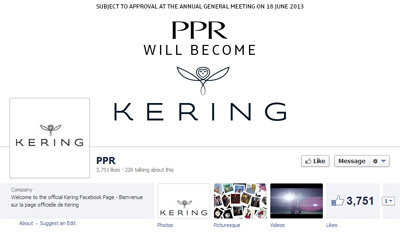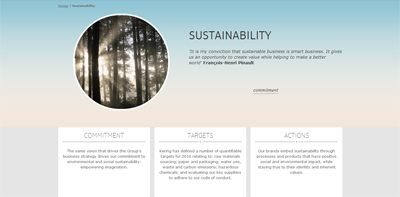 Brioni spring/summer 2014 collection image
Brioni spring/summer 2014 collection image
French luxury conglomerate Kering is doing its part to promote sustainability by partnering with a new technology company to develop innovative strategies for recycling fabric.
Textile waste is a significant problem in the fashion industry, and the pioneering start-up Worn Again is seeking to solve it once and for good by creating chemical recycling technology that will allow fabric to be repurposed. By partnering with Worn Again, Kering is reaffirming its commitment to ending textile waste in the luxury industry.
"Let’s face it – consumer goods lead to consumer wastes," said Bob McKee, fashion industry strategy director at Infor, Chicago.
"Culpability for this Fashion challenge rests with everyone from maker to brand owner to consumer, but luxury is probably a bit of a dichotomy. The good news is that luxury often costs too much for many people to dispose of it - luxury isn’t generally a landfill problem.
"The bad news is many luxury items are made of materials that either don’t degrade easily or if they do go into landfill are quite possibly containing heavy or toxic metals.
Mr. McKee is not affiliated with Kering, but agreed to comment as an industry expert.
Kering was unable to respond by press deadline.
Good as new
Kering announced that it will be working with Worn Again to develop textile recycling technology that will help address the worldwide problem of fabric waste. Currently, global production of polyester filament and cotton fiber has reached 65 million tons, and that number is expected to increase in coming years, making the problem of textile waste a serious issue that must be resolved.
Kering regularly supports sustainable initiatives
Worn Again’s technology will work to separate and extract polyester and cotton of textiles that have been discarded. These materials would then be able to be re-spun into new fabric, thus helping to reduce the waste that would otherwise occur.
The problem of how to separate blended fibers is one that has not yet been addressed by traditional recycling methods; it is also difficult to separate dyes from colored fabrics. Worn Again’s technology could potentially resolve both of these issues, allowing old fabric to be repurposed and recolored.
The conglomerate has a Web site devoted to sustainability
Kering has agreed to monitor Worn Again’s next phase of testing, during which they will work to convert the new raw materials that have been created into yarn and eventually garments. By taking the project to the next level, Kering and Worn Again aim to show that this technology could have a major practical effect on the fashion industry.
Finding new sources of raw materials that do not require the use of oil is essential to maintaining global sustainability. As a major worldwide industry that produces a lot of waste, it is important for fashion to be involved in taking steps to guarantee sustainability in the future.
Ideally, fashion brands, textile suppliers and consumers would all work together to keep clothing out of the landfill and recycle both individual garments and the materials used to make them. Promoting a model of circular fashion would ensure that the industry has less of an impact on the global environment.
It is important for luxury brands to participate in sustainable initiatives
Green machine
Kering has long been a strong supporter of the environment and regularly speaks out about the importance of sustainability in the fashion industry. The luxury conglomerate spoke at the third Copenhagen Fashion Summit on sustainability in 2014 to highlight its work.
Since the first Copenhagen Fashion Summit in 2009, Kering has been a keynote speaker at the biennial event. Kering is able to position itself as a leader in sustainability practices among luxury brands and companies through this participation (see story).
Kering also takes action itself to improve sustainability among its brands. For example, the luxury conglomerate promoted its carbon reduction actions after earning awards from the Carbon Disclosure Project and the Dow Jones Sustainability Indices in 2014.
Kering was one of 10 French companies to receive an “A” grade for its commitment to climate change decisions. As ecological concerns become more widely held among consumers, brands will take bolder steps toward becoming environmentally sustainable (see story).
This new partnership with Worn Again will keep Kering at the cutting edge of the sustainability movement.
"I see a time in our future where this conversation just won’t make sense to anyone, because social responsibility will have become such an inherent part of our way of life," Mr. McKee said. "The impact of our global environment footprint will be something taken more seriously by all.
"Normal labeling will include the carbon footprint of every item we consider for purchase."
Final Take
Kay Sorin, editorial assistant on Luxury Daily, New York



